AMP's Ethical Code: Corporate Governance, Scandals, and Solutions
VerifiedAdded on 2023/04/21
|12
|2820
|337
Report
AI Summary
This report provides an analysis of the ethical code of conduct at AMP, focusing on critical corporate governance issues such as exploitation, discrimination, corruption, and whistleblowing. It uses external sources like news articles to highlight violations of rules and regulations, specifically addressing instances of charging insurance premiums from deceased individuals. The report contrasts AMP's practices with companies like Wesfarmers and Stockland, emphasizing the importance of honesty, integrity, and accountability. It also discusses the role of whistleblowing, the need for whistleblower protections, and the importance of frameworks for developing effective policies and practices. The report suggests that AMP needs to improve communication, implement regular audits, and seek expert assistance to address these ethical issues and enhance its corporate governance.
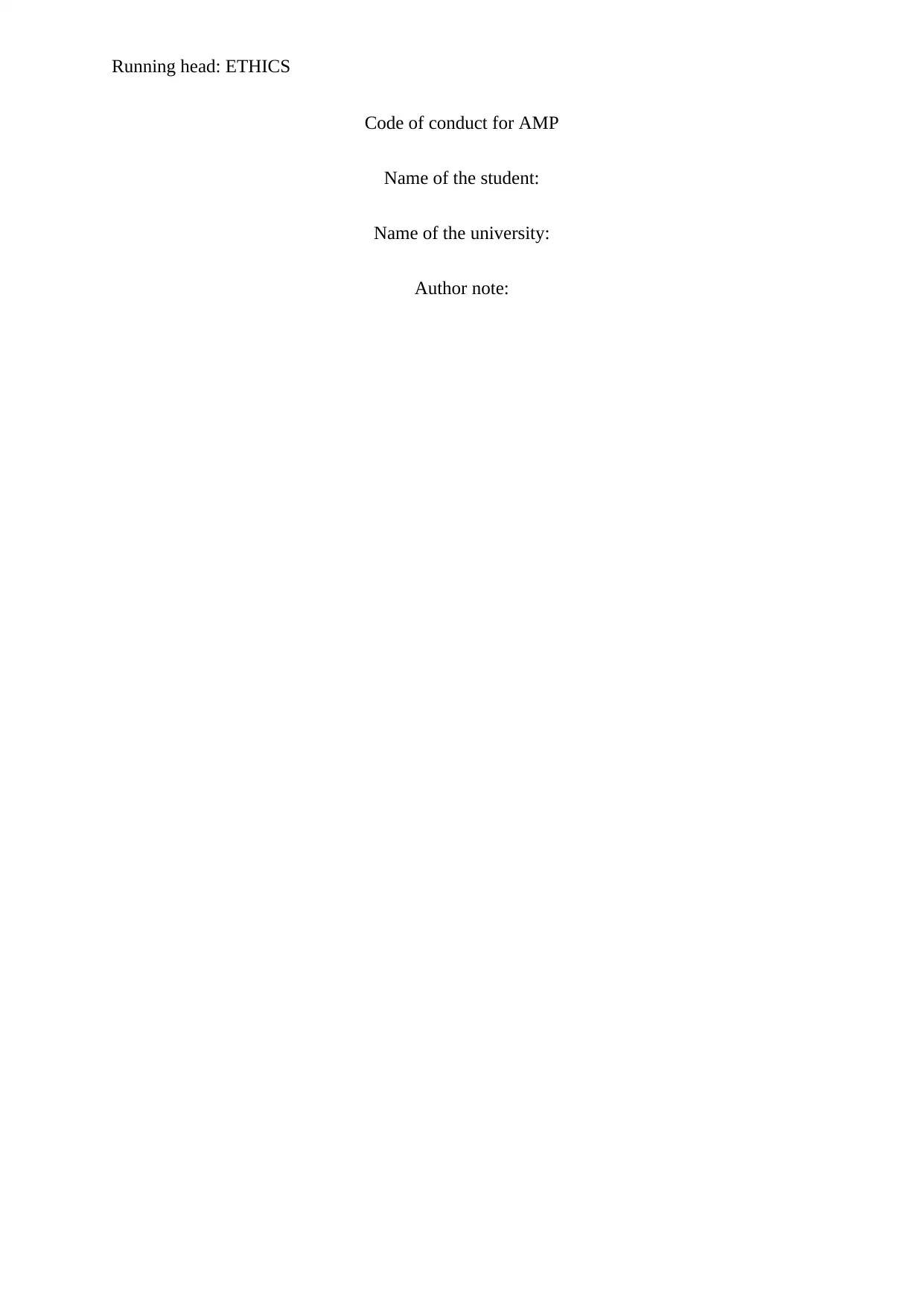
Running head: ETHICS
Code of conduct for AMP
Name of the student:
Name of the university:
Author note:
Code of conduct for AMP
Name of the student:
Name of the university:
Author note:
Paraphrase This Document
Need a fresh take? Get an instant paraphrase of this document with our AI Paraphraser
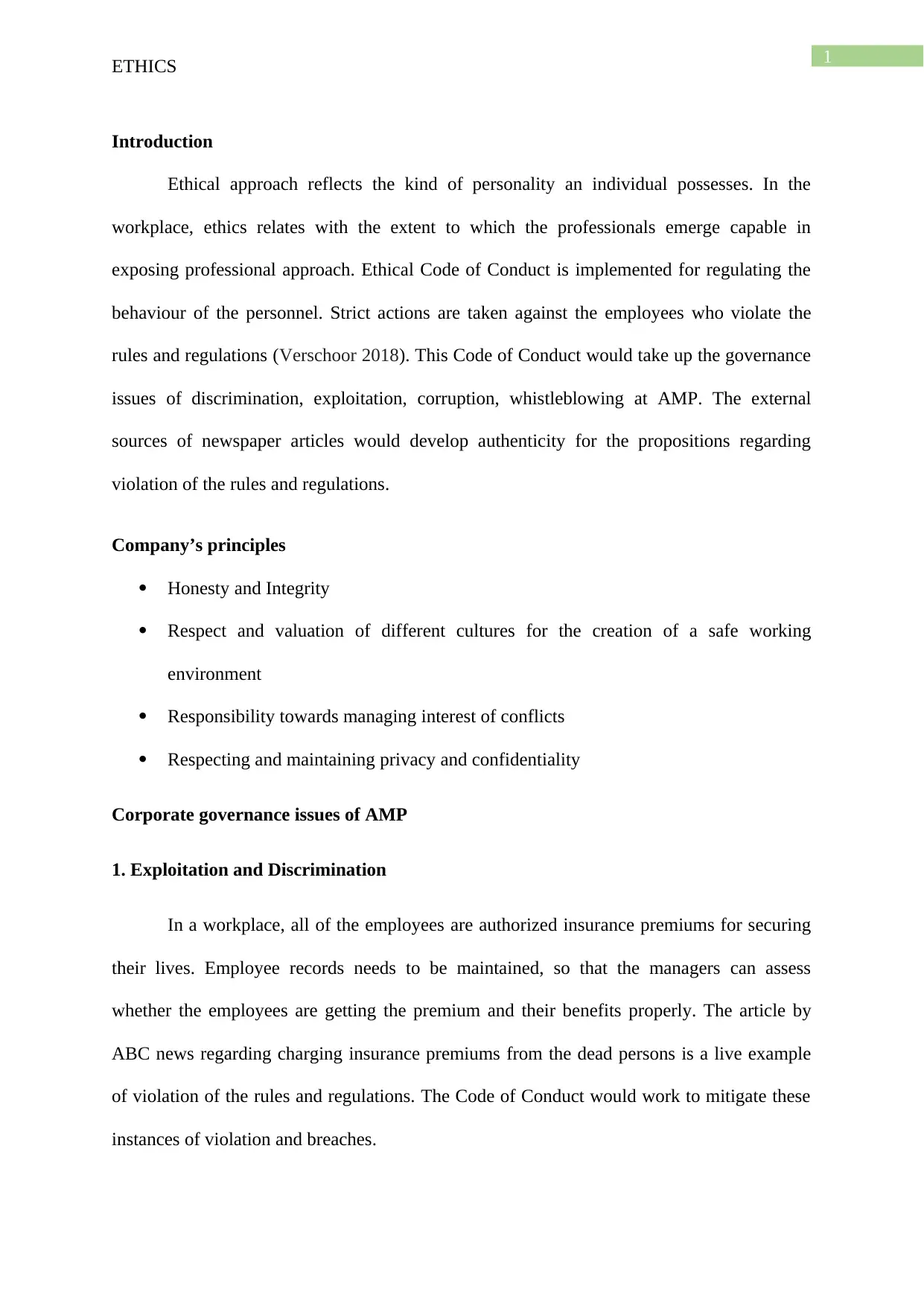
1
ETHICS
Introduction
Ethical approach reflects the kind of personality an individual possesses. In the
workplace, ethics relates with the extent to which the professionals emerge capable in
exposing professional approach. Ethical Code of Conduct is implemented for regulating the
behaviour of the personnel. Strict actions are taken against the employees who violate the
rules and regulations (Verschoor 2018). This Code of Conduct would take up the governance
issues of discrimination, exploitation, corruption, whistleblowing at AMP. The external
sources of newspaper articles would develop authenticity for the propositions regarding
violation of the rules and regulations.
Company’s principles
Honesty and Integrity
Respect and valuation of different cultures for the creation of a safe working
environment
Responsibility towards managing interest of conflicts
Respecting and maintaining privacy and confidentiality
Corporate governance issues of AMP
1. Exploitation and Discrimination
In a workplace, all of the employees are authorized insurance premiums for securing
their lives. Employee records needs to be maintained, so that the managers can assess
whether the employees are getting the premium and their benefits properly. The article by
ABC news regarding charging insurance premiums from the dead persons is a live example
of violation of the rules and regulations. The Code of Conduct would work to mitigate these
instances of violation and breaches.
ETHICS
Introduction
Ethical approach reflects the kind of personality an individual possesses. In the
workplace, ethics relates with the extent to which the professionals emerge capable in
exposing professional approach. Ethical Code of Conduct is implemented for regulating the
behaviour of the personnel. Strict actions are taken against the employees who violate the
rules and regulations (Verschoor 2018). This Code of Conduct would take up the governance
issues of discrimination, exploitation, corruption, whistleblowing at AMP. The external
sources of newspaper articles would develop authenticity for the propositions regarding
violation of the rules and regulations.
Company’s principles
Honesty and Integrity
Respect and valuation of different cultures for the creation of a safe working
environment
Responsibility towards managing interest of conflicts
Respecting and maintaining privacy and confidentiality
Corporate governance issues of AMP
1. Exploitation and Discrimination
In a workplace, all of the employees are authorized insurance premiums for securing
their lives. Employee records needs to be maintained, so that the managers can assess
whether the employees are getting the premium and their benefits properly. The article by
ABC news regarding charging insurance premiums from the dead persons is a live example
of violation of the rules and regulations. The Code of Conduct would work to mitigate these
instances of violation and breaches.
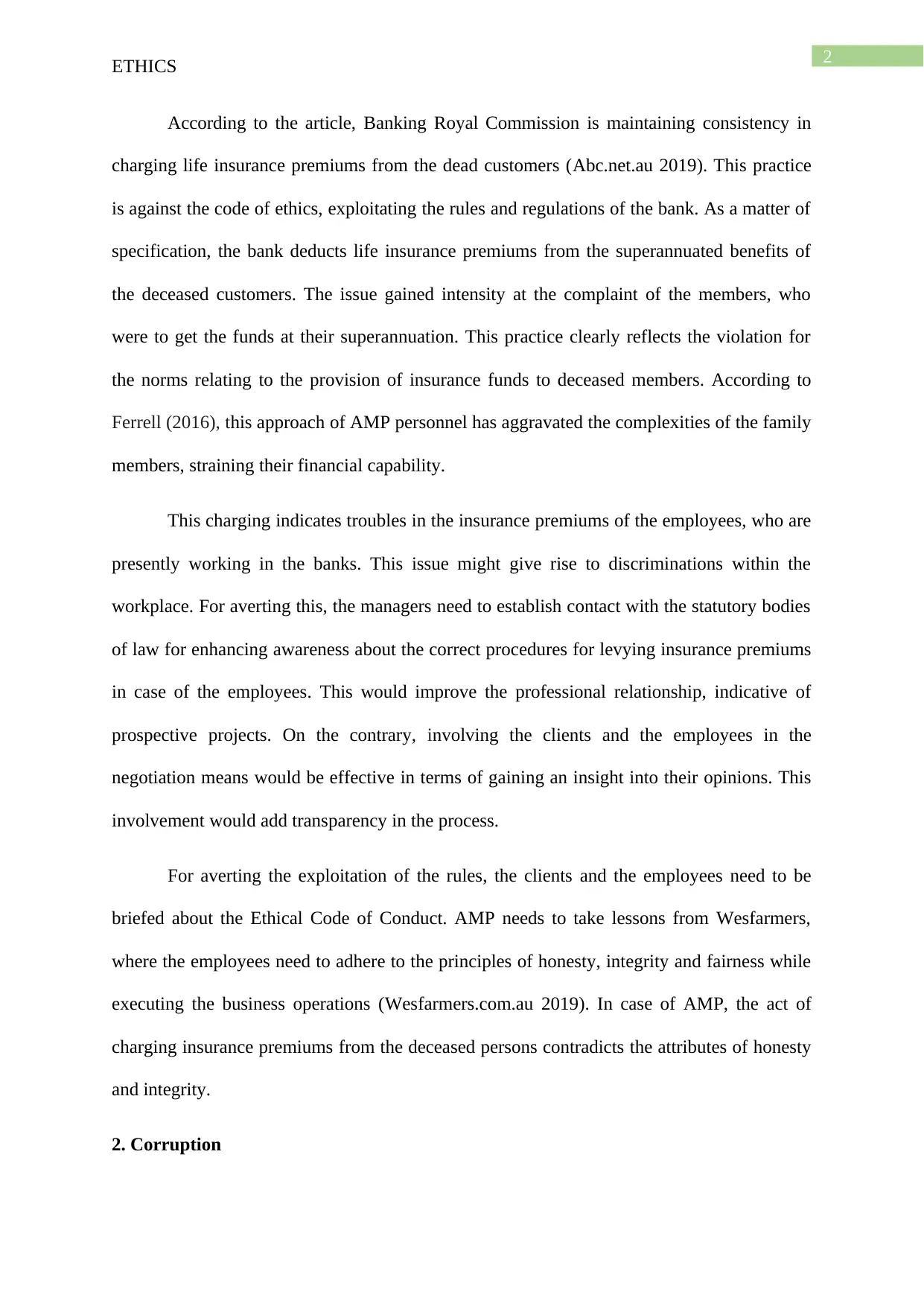
2
ETHICS
According to the article, Banking Royal Commission is maintaining consistency in
charging life insurance premiums from the dead customers (Abc.net.au 2019). This practice
is against the code of ethics, exploitating the rules and regulations of the bank. As a matter of
specification, the bank deducts life insurance premiums from the superannuated benefits of
the deceased customers. The issue gained intensity at the complaint of the members, who
were to get the funds at their superannuation. This practice clearly reflects the violation for
the norms relating to the provision of insurance funds to deceased members. According to
Ferrell (2016), this approach of AMP personnel has aggravated the complexities of the family
members, straining their financial capability.
This charging indicates troubles in the insurance premiums of the employees, who are
presently working in the banks. This issue might give rise to discriminations within the
workplace. For averting this, the managers need to establish contact with the statutory bodies
of law for enhancing awareness about the correct procedures for levying insurance premiums
in case of the employees. This would improve the professional relationship, indicative of
prospective projects. On the contrary, involving the clients and the employees in the
negotiation means would be effective in terms of gaining an insight into their opinions. This
involvement would add transparency in the process.
For averting the exploitation of the rules, the clients and the employees need to be
briefed about the Ethical Code of Conduct. AMP needs to take lessons from Wesfarmers,
where the employees need to adhere to the principles of honesty, integrity and fairness while
executing the business operations (Wesfarmers.com.au 2019). In case of AMP, the act of
charging insurance premiums from the deceased persons contradicts the attributes of honesty
and integrity.
2. Corruption
ETHICS
According to the article, Banking Royal Commission is maintaining consistency in
charging life insurance premiums from the dead customers (Abc.net.au 2019). This practice
is against the code of ethics, exploitating the rules and regulations of the bank. As a matter of
specification, the bank deducts life insurance premiums from the superannuated benefits of
the deceased customers. The issue gained intensity at the complaint of the members, who
were to get the funds at their superannuation. This practice clearly reflects the violation for
the norms relating to the provision of insurance funds to deceased members. According to
Ferrell (2016), this approach of AMP personnel has aggravated the complexities of the family
members, straining their financial capability.
This charging indicates troubles in the insurance premiums of the employees, who are
presently working in the banks. This issue might give rise to discriminations within the
workplace. For averting this, the managers need to establish contact with the statutory bodies
of law for enhancing awareness about the correct procedures for levying insurance premiums
in case of the employees. This would improve the professional relationship, indicative of
prospective projects. On the contrary, involving the clients and the employees in the
negotiation means would be effective in terms of gaining an insight into their opinions. This
involvement would add transparency in the process.
For averting the exploitation of the rules, the clients and the employees need to be
briefed about the Ethical Code of Conduct. AMP needs to take lessons from Wesfarmers,
where the employees need to adhere to the principles of honesty, integrity and fairness while
executing the business operations (Wesfarmers.com.au 2019). In case of AMP, the act of
charging insurance premiums from the deceased persons contradicts the attributes of honesty
and integrity.
2. Corruption
⊘ This is a preview!⊘
Do you want full access?
Subscribe today to unlock all pages.

Trusted by 1+ million students worldwide
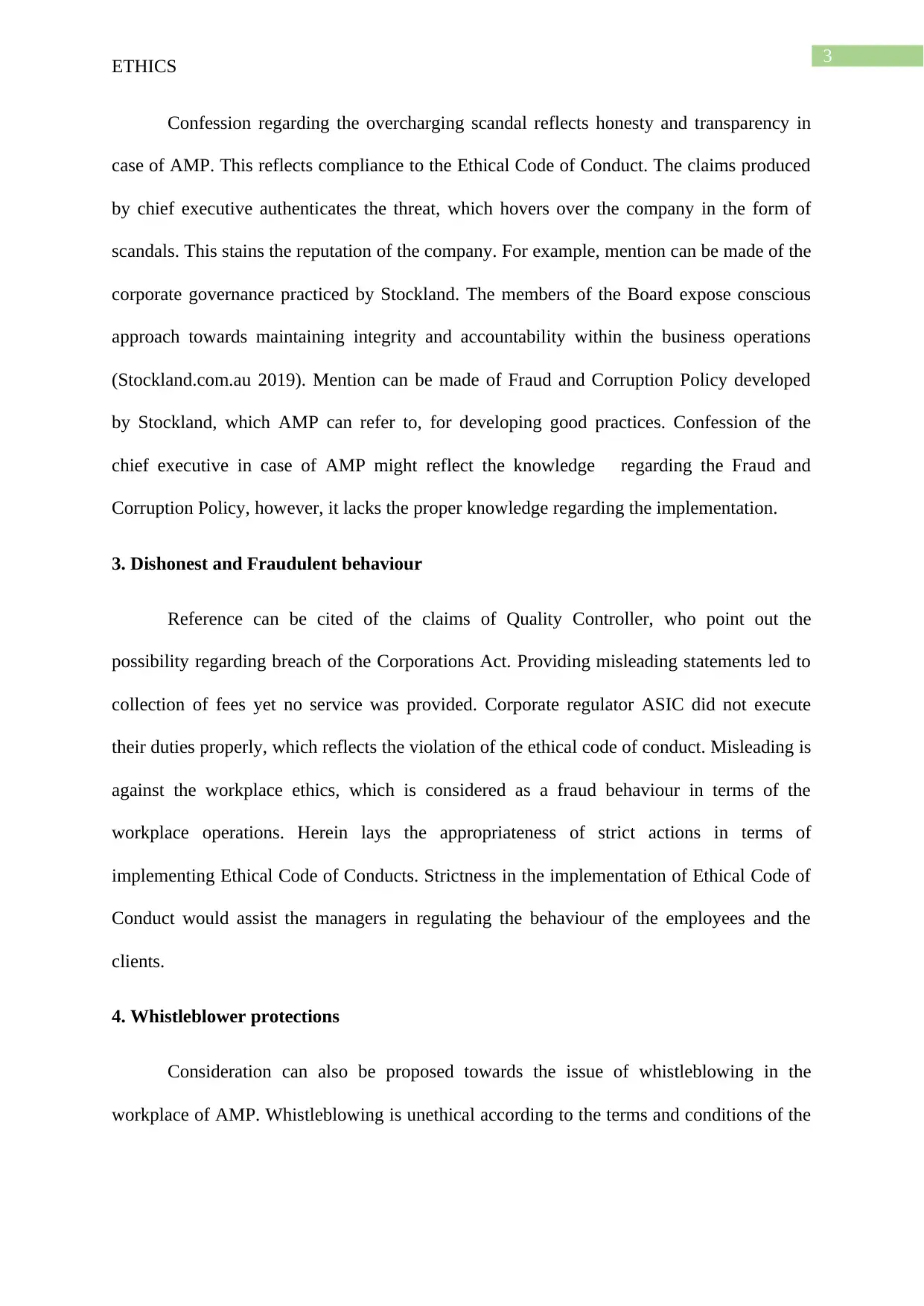
3
ETHICS
Confession regarding the overcharging scandal reflects honesty and transparency in
case of AMP. This reflects compliance to the Ethical Code of Conduct. The claims produced
by chief executive authenticates the threat, which hovers over the company in the form of
scandals. This stains the reputation of the company. For example, mention can be made of the
corporate governance practiced by Stockland. The members of the Board expose conscious
approach towards maintaining integrity and accountability within the business operations
(Stockland.com.au 2019). Mention can be made of Fraud and Corruption Policy developed
by Stockland, which AMP can refer to, for developing good practices. Confession of the
chief executive in case of AMP might reflect the knowledge regarding the Fraud and
Corruption Policy, however, it lacks the proper knowledge regarding the implementation.
3. Dishonest and Fraudulent behaviour
Reference can be cited of the claims of Quality Controller, who point out the
possibility regarding breach of the Corporations Act. Providing misleading statements led to
collection of fees yet no service was provided. Corporate regulator ASIC did not execute
their duties properly, which reflects the violation of the ethical code of conduct. Misleading is
against the workplace ethics, which is considered as a fraud behaviour in terms of the
workplace operations. Herein lays the appropriateness of strict actions in terms of
implementing Ethical Code of Conducts. Strictness in the implementation of Ethical Code of
Conduct would assist the managers in regulating the behaviour of the employees and the
clients.
4. Whistleblower protections
Consideration can also be proposed towards the issue of whistleblowing in the
workplace of AMP. Whistleblowing is unethical according to the terms and conditions of the
ETHICS
Confession regarding the overcharging scandal reflects honesty and transparency in
case of AMP. This reflects compliance to the Ethical Code of Conduct. The claims produced
by chief executive authenticates the threat, which hovers over the company in the form of
scandals. This stains the reputation of the company. For example, mention can be made of the
corporate governance practiced by Stockland. The members of the Board expose conscious
approach towards maintaining integrity and accountability within the business operations
(Stockland.com.au 2019). Mention can be made of Fraud and Corruption Policy developed
by Stockland, which AMP can refer to, for developing good practices. Confession of the
chief executive in case of AMP might reflect the knowledge regarding the Fraud and
Corruption Policy, however, it lacks the proper knowledge regarding the implementation.
3. Dishonest and Fraudulent behaviour
Reference can be cited of the claims of Quality Controller, who point out the
possibility regarding breach of the Corporations Act. Providing misleading statements led to
collection of fees yet no service was provided. Corporate regulator ASIC did not execute
their duties properly, which reflects the violation of the ethical code of conduct. Misleading is
against the workplace ethics, which is considered as a fraud behaviour in terms of the
workplace operations. Herein lays the appropriateness of strict actions in terms of
implementing Ethical Code of Conducts. Strictness in the implementation of Ethical Code of
Conduct would assist the managers in regulating the behaviour of the employees and the
clients.
4. Whistleblower protections
Consideration can also be proposed towards the issue of whistleblowing in the
workplace of AMP. Whistleblowing is unethical according to the terms and conditions of the
Paraphrase This Document
Need a fresh take? Get an instant paraphrase of this document with our AI Paraphraser
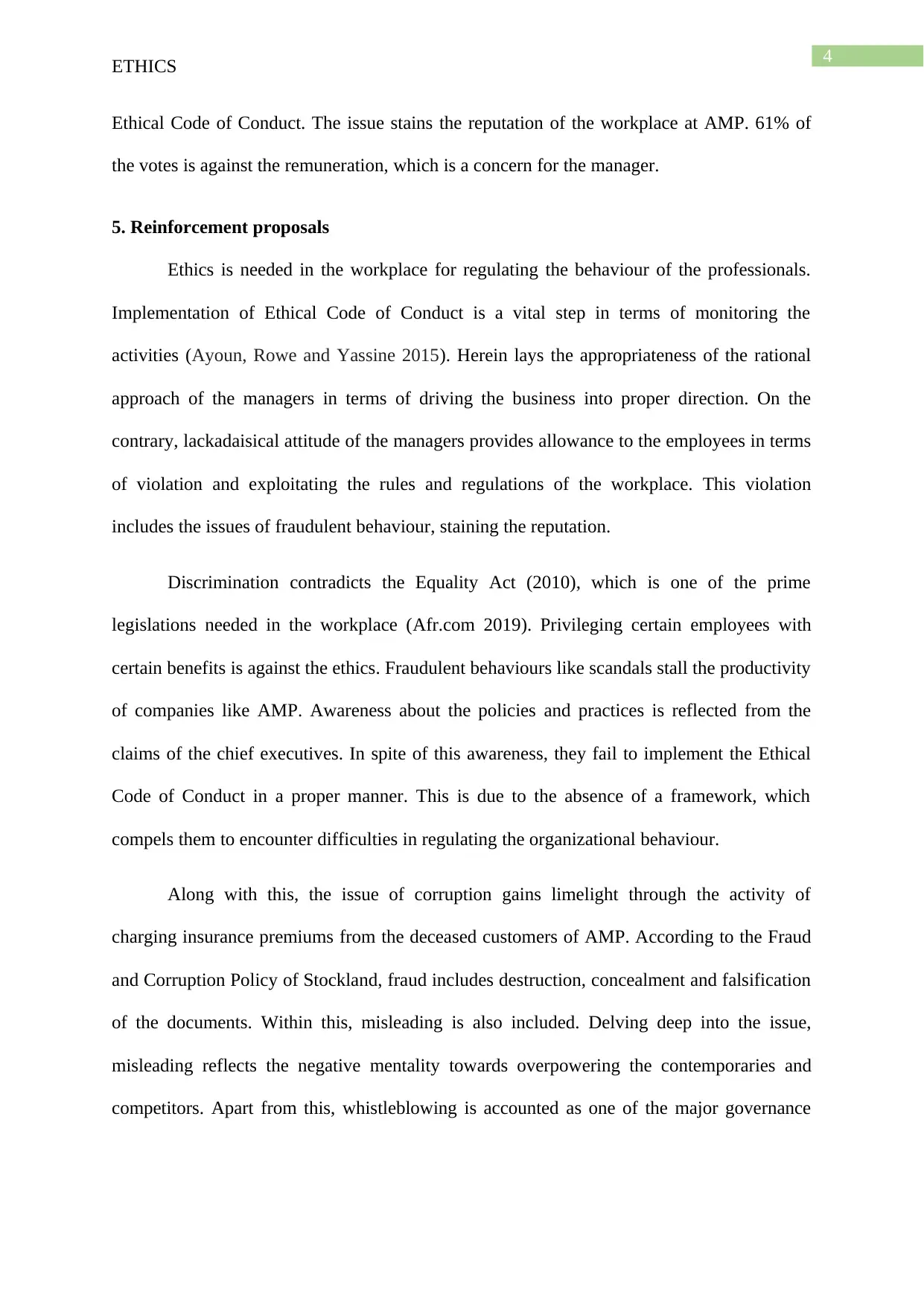
4
ETHICS
Ethical Code of Conduct. The issue stains the reputation of the workplace at AMP. 61% of
the votes is against the remuneration, which is a concern for the manager.
5. Reinforcement proposals
Ethics is needed in the workplace for regulating the behaviour of the professionals.
Implementation of Ethical Code of Conduct is a vital step in terms of monitoring the
activities (Ayoun, Rowe and Yassine 2015). Herein lays the appropriateness of the rational
approach of the managers in terms of driving the business into proper direction. On the
contrary, lackadaisical attitude of the managers provides allowance to the employees in terms
of violation and exploitating the rules and regulations of the workplace. This violation
includes the issues of fraudulent behaviour, staining the reputation.
Discrimination contradicts the Equality Act (2010), which is one of the prime
legislations needed in the workplace (Afr.com 2019). Privileging certain employees with
certain benefits is against the ethics. Fraudulent behaviours like scandals stall the productivity
of companies like AMP. Awareness about the policies and practices is reflected from the
claims of the chief executives. In spite of this awareness, they fail to implement the Ethical
Code of Conduct in a proper manner. This is due to the absence of a framework, which
compels them to encounter difficulties in regulating the organizational behaviour.
Along with this, the issue of corruption gains limelight through the activity of
charging insurance premiums from the deceased customers of AMP. According to the Fraud
and Corruption Policy of Stockland, fraud includes destruction, concealment and falsification
of the documents. Within this, misleading is also included. Delving deep into the issue,
misleading reflects the negative mentality towards overpowering the contemporaries and
competitors. Apart from this, whistleblowing is accounted as one of the major governance
ETHICS
Ethical Code of Conduct. The issue stains the reputation of the workplace at AMP. 61% of
the votes is against the remuneration, which is a concern for the manager.
5. Reinforcement proposals
Ethics is needed in the workplace for regulating the behaviour of the professionals.
Implementation of Ethical Code of Conduct is a vital step in terms of monitoring the
activities (Ayoun, Rowe and Yassine 2015). Herein lays the appropriateness of the rational
approach of the managers in terms of driving the business into proper direction. On the
contrary, lackadaisical attitude of the managers provides allowance to the employees in terms
of violation and exploitating the rules and regulations of the workplace. This violation
includes the issues of fraudulent behaviour, staining the reputation.
Discrimination contradicts the Equality Act (2010), which is one of the prime
legislations needed in the workplace (Afr.com 2019). Privileging certain employees with
certain benefits is against the ethics. Fraudulent behaviours like scandals stall the productivity
of companies like AMP. Awareness about the policies and practices is reflected from the
claims of the chief executives. In spite of this awareness, they fail to implement the Ethical
Code of Conduct in a proper manner. This is due to the absence of a framework, which
compels them to encounter difficulties in regulating the organizational behaviour.
Along with this, the issue of corruption gains limelight through the activity of
charging insurance premiums from the deceased customers of AMP. According to the Fraud
and Corruption Policy of Stockland, fraud includes destruction, concealment and falsification
of the documents. Within this, misleading is also included. Delving deep into the issue,
misleading reflects the negative mentality towards overpowering the contemporaries and
competitors. Apart from this, whistleblowing is accounted as one of the major governance
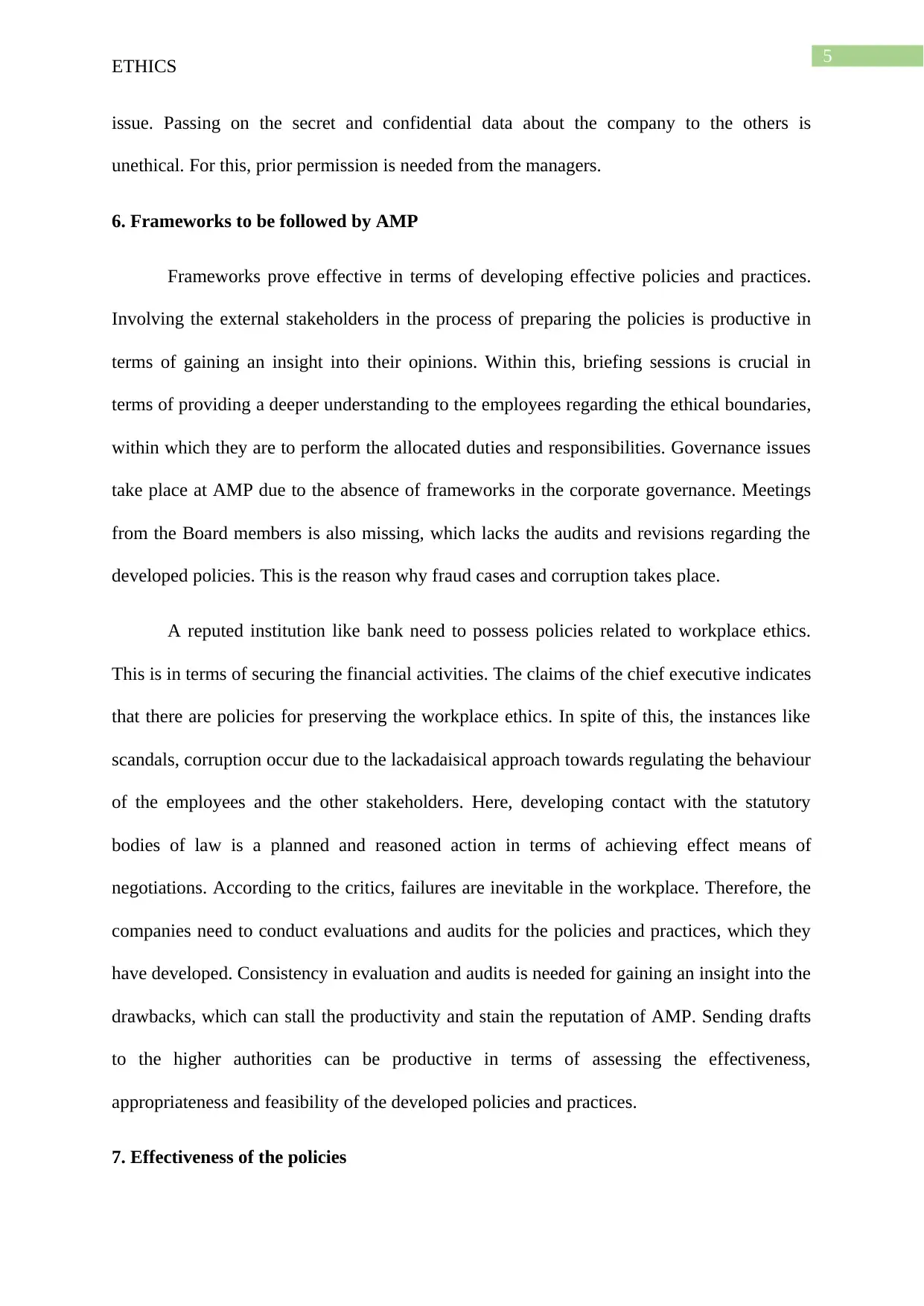
5
ETHICS
issue. Passing on the secret and confidential data about the company to the others is
unethical. For this, prior permission is needed from the managers.
6. Frameworks to be followed by AMP
Frameworks prove effective in terms of developing effective policies and practices.
Involving the external stakeholders in the process of preparing the policies is productive in
terms of gaining an insight into their opinions. Within this, briefing sessions is crucial in
terms of providing a deeper understanding to the employees regarding the ethical boundaries,
within which they are to perform the allocated duties and responsibilities. Governance issues
take place at AMP due to the absence of frameworks in the corporate governance. Meetings
from the Board members is also missing, which lacks the audits and revisions regarding the
developed policies. This is the reason why fraud cases and corruption takes place.
A reputed institution like bank need to possess policies related to workplace ethics.
This is in terms of securing the financial activities. The claims of the chief executive indicates
that there are policies for preserving the workplace ethics. In spite of this, the instances like
scandals, corruption occur due to the lackadaisical approach towards regulating the behaviour
of the employees and the other stakeholders. Here, developing contact with the statutory
bodies of law is a planned and reasoned action in terms of achieving effect means of
negotiations. According to the critics, failures are inevitable in the workplace. Therefore, the
companies need to conduct evaluations and audits for the policies and practices, which they
have developed. Consistency in evaluation and audits is needed for gaining an insight into the
drawbacks, which can stall the productivity and stain the reputation of AMP. Sending drafts
to the higher authorities can be productive in terms of assessing the effectiveness,
appropriateness and feasibility of the developed policies and practices.
7. Effectiveness of the policies
ETHICS
issue. Passing on the secret and confidential data about the company to the others is
unethical. For this, prior permission is needed from the managers.
6. Frameworks to be followed by AMP
Frameworks prove effective in terms of developing effective policies and practices.
Involving the external stakeholders in the process of preparing the policies is productive in
terms of gaining an insight into their opinions. Within this, briefing sessions is crucial in
terms of providing a deeper understanding to the employees regarding the ethical boundaries,
within which they are to perform the allocated duties and responsibilities. Governance issues
take place at AMP due to the absence of frameworks in the corporate governance. Meetings
from the Board members is also missing, which lacks the audits and revisions regarding the
developed policies. This is the reason why fraud cases and corruption takes place.
A reputed institution like bank need to possess policies related to workplace ethics.
This is in terms of securing the financial activities. The claims of the chief executive indicates
that there are policies for preserving the workplace ethics. In spite of this, the instances like
scandals, corruption occur due to the lackadaisical approach towards regulating the behaviour
of the employees and the other stakeholders. Here, developing contact with the statutory
bodies of law is a planned and reasoned action in terms of achieving effect means of
negotiations. According to the critics, failures are inevitable in the workplace. Therefore, the
companies need to conduct evaluations and audits for the policies and practices, which they
have developed. Consistency in evaluation and audits is needed for gaining an insight into the
drawbacks, which can stall the productivity and stain the reputation of AMP. Sending drafts
to the higher authorities can be productive in terms of assessing the effectiveness,
appropriateness and feasibility of the developed policies and practices.
7. Effectiveness of the policies
⊘ This is a preview!⊘
Do you want full access?
Subscribe today to unlock all pages.

Trusted by 1+ million students worldwide
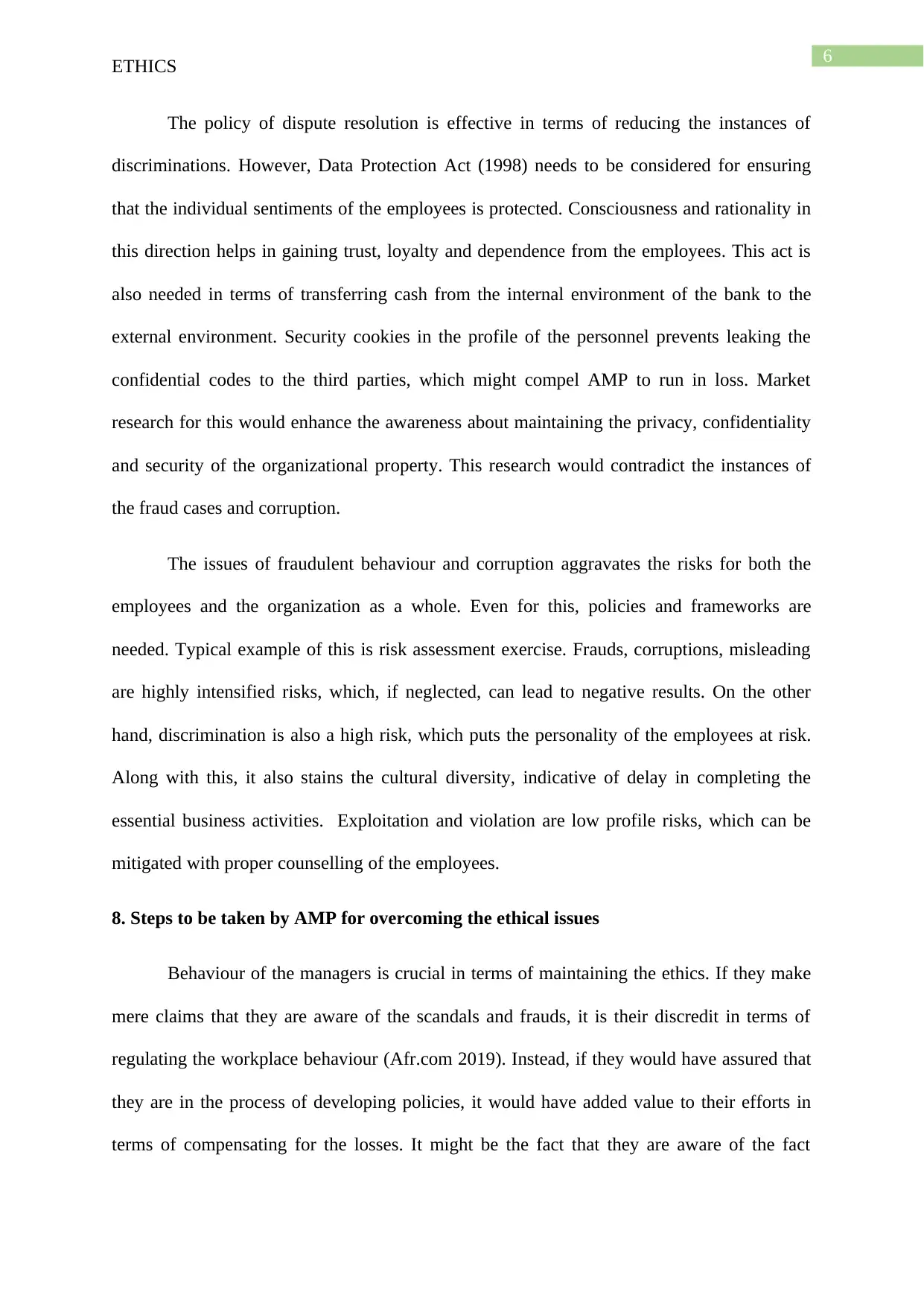
6
ETHICS
The policy of dispute resolution is effective in terms of reducing the instances of
discriminations. However, Data Protection Act (1998) needs to be considered for ensuring
that the individual sentiments of the employees is protected. Consciousness and rationality in
this direction helps in gaining trust, loyalty and dependence from the employees. This act is
also needed in terms of transferring cash from the internal environment of the bank to the
external environment. Security cookies in the profile of the personnel prevents leaking the
confidential codes to the third parties, which might compel AMP to run in loss. Market
research for this would enhance the awareness about maintaining the privacy, confidentiality
and security of the organizational property. This research would contradict the instances of
the fraud cases and corruption.
The issues of fraudulent behaviour and corruption aggravates the risks for both the
employees and the organization as a whole. Even for this, policies and frameworks are
needed. Typical example of this is risk assessment exercise. Frauds, corruptions, misleading
are highly intensified risks, which, if neglected, can lead to negative results. On the other
hand, discrimination is also a high risk, which puts the personality of the employees at risk.
Along with this, it also stains the cultural diversity, indicative of delay in completing the
essential business activities. Exploitation and violation are low profile risks, which can be
mitigated with proper counselling of the employees.
8. Steps to be taken by AMP for overcoming the ethical issues
Behaviour of the managers is crucial in terms of maintaining the ethics. If they make
mere claims that they are aware of the scandals and frauds, it is their discredit in terms of
regulating the workplace behaviour (Afr.com 2019). Instead, if they would have assured that
they are in the process of developing policies, it would have added value to their efforts in
terms of compensating for the losses. It might be the fact that they are aware of the fact
ETHICS
The policy of dispute resolution is effective in terms of reducing the instances of
discriminations. However, Data Protection Act (1998) needs to be considered for ensuring
that the individual sentiments of the employees is protected. Consciousness and rationality in
this direction helps in gaining trust, loyalty and dependence from the employees. This act is
also needed in terms of transferring cash from the internal environment of the bank to the
external environment. Security cookies in the profile of the personnel prevents leaking the
confidential codes to the third parties, which might compel AMP to run in loss. Market
research for this would enhance the awareness about maintaining the privacy, confidentiality
and security of the organizational property. This research would contradict the instances of
the fraud cases and corruption.
The issues of fraudulent behaviour and corruption aggravates the risks for both the
employees and the organization as a whole. Even for this, policies and frameworks are
needed. Typical example of this is risk assessment exercise. Frauds, corruptions, misleading
are highly intensified risks, which, if neglected, can lead to negative results. On the other
hand, discrimination is also a high risk, which puts the personality of the employees at risk.
Along with this, it also stains the cultural diversity, indicative of delay in completing the
essential business activities. Exploitation and violation are low profile risks, which can be
mitigated with proper counselling of the employees.
8. Steps to be taken by AMP for overcoming the ethical issues
Behaviour of the managers is crucial in terms of maintaining the ethics. If they make
mere claims that they are aware of the scandals and frauds, it is their discredit in terms of
regulating the workplace behaviour (Afr.com 2019). Instead, if they would have assured that
they are in the process of developing policies, it would have added value to their efforts in
terms of compensating for the losses. It might be the fact that they are aware of the fact
Paraphrase This Document
Need a fresh take? Get an instant paraphrase of this document with our AI Paraphraser
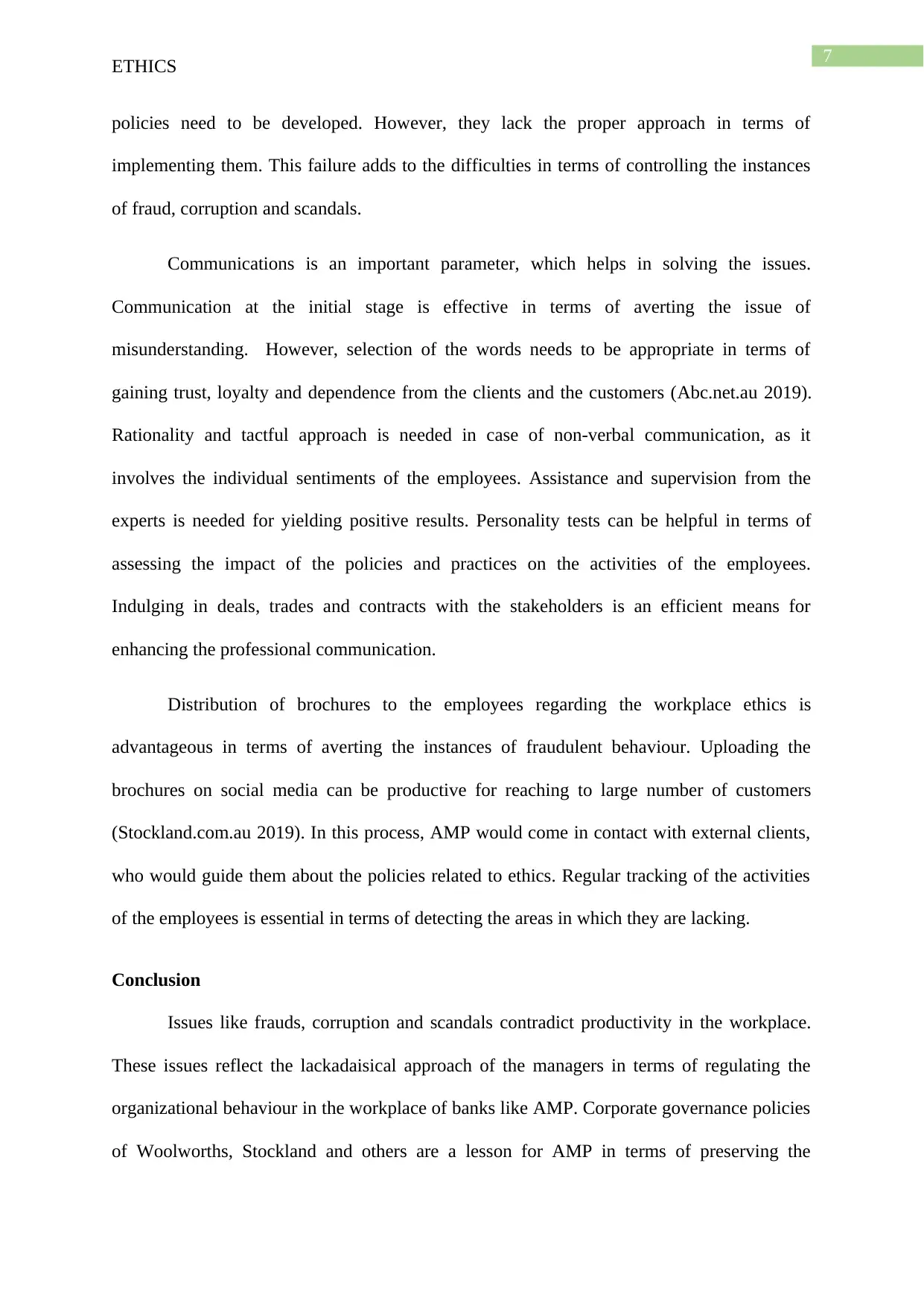
7
ETHICS
policies need to be developed. However, they lack the proper approach in terms of
implementing them. This failure adds to the difficulties in terms of controlling the instances
of fraud, corruption and scandals.
Communications is an important parameter, which helps in solving the issues.
Communication at the initial stage is effective in terms of averting the issue of
misunderstanding. However, selection of the words needs to be appropriate in terms of
gaining trust, loyalty and dependence from the clients and the customers (Abc.net.au 2019).
Rationality and tactful approach is needed in case of non-verbal communication, as it
involves the individual sentiments of the employees. Assistance and supervision from the
experts is needed for yielding positive results. Personality tests can be helpful in terms of
assessing the impact of the policies and practices on the activities of the employees.
Indulging in deals, trades and contracts with the stakeholders is an efficient means for
enhancing the professional communication.
Distribution of brochures to the employees regarding the workplace ethics is
advantageous in terms of averting the instances of fraudulent behaviour. Uploading the
brochures on social media can be productive for reaching to large number of customers
(Stockland.com.au 2019). In this process, AMP would come in contact with external clients,
who would guide them about the policies related to ethics. Regular tracking of the activities
of the employees is essential in terms of detecting the areas in which they are lacking.
Conclusion
Issues like frauds, corruption and scandals contradict productivity in the workplace.
These issues reflect the lackadaisical approach of the managers in terms of regulating the
organizational behaviour in the workplace of banks like AMP. Corporate governance policies
of Woolworths, Stockland and others are a lesson for AMP in terms of preserving the
ETHICS
policies need to be developed. However, they lack the proper approach in terms of
implementing them. This failure adds to the difficulties in terms of controlling the instances
of fraud, corruption and scandals.
Communications is an important parameter, which helps in solving the issues.
Communication at the initial stage is effective in terms of averting the issue of
misunderstanding. However, selection of the words needs to be appropriate in terms of
gaining trust, loyalty and dependence from the clients and the customers (Abc.net.au 2019).
Rationality and tactful approach is needed in case of non-verbal communication, as it
involves the individual sentiments of the employees. Assistance and supervision from the
experts is needed for yielding positive results. Personality tests can be helpful in terms of
assessing the impact of the policies and practices on the activities of the employees.
Indulging in deals, trades and contracts with the stakeholders is an efficient means for
enhancing the professional communication.
Distribution of brochures to the employees regarding the workplace ethics is
advantageous in terms of averting the instances of fraudulent behaviour. Uploading the
brochures on social media can be productive for reaching to large number of customers
(Stockland.com.au 2019). In this process, AMP would come in contact with external clients,
who would guide them about the policies related to ethics. Regular tracking of the activities
of the employees is essential in terms of detecting the areas in which they are lacking.
Conclusion
Issues like frauds, corruption and scandals contradict productivity in the workplace.
These issues reflect the lackadaisical approach of the managers in terms of regulating the
organizational behaviour in the workplace of banks like AMP. Corporate governance policies
of Woolworths, Stockland and others are a lesson for AMP in terms of preserving the
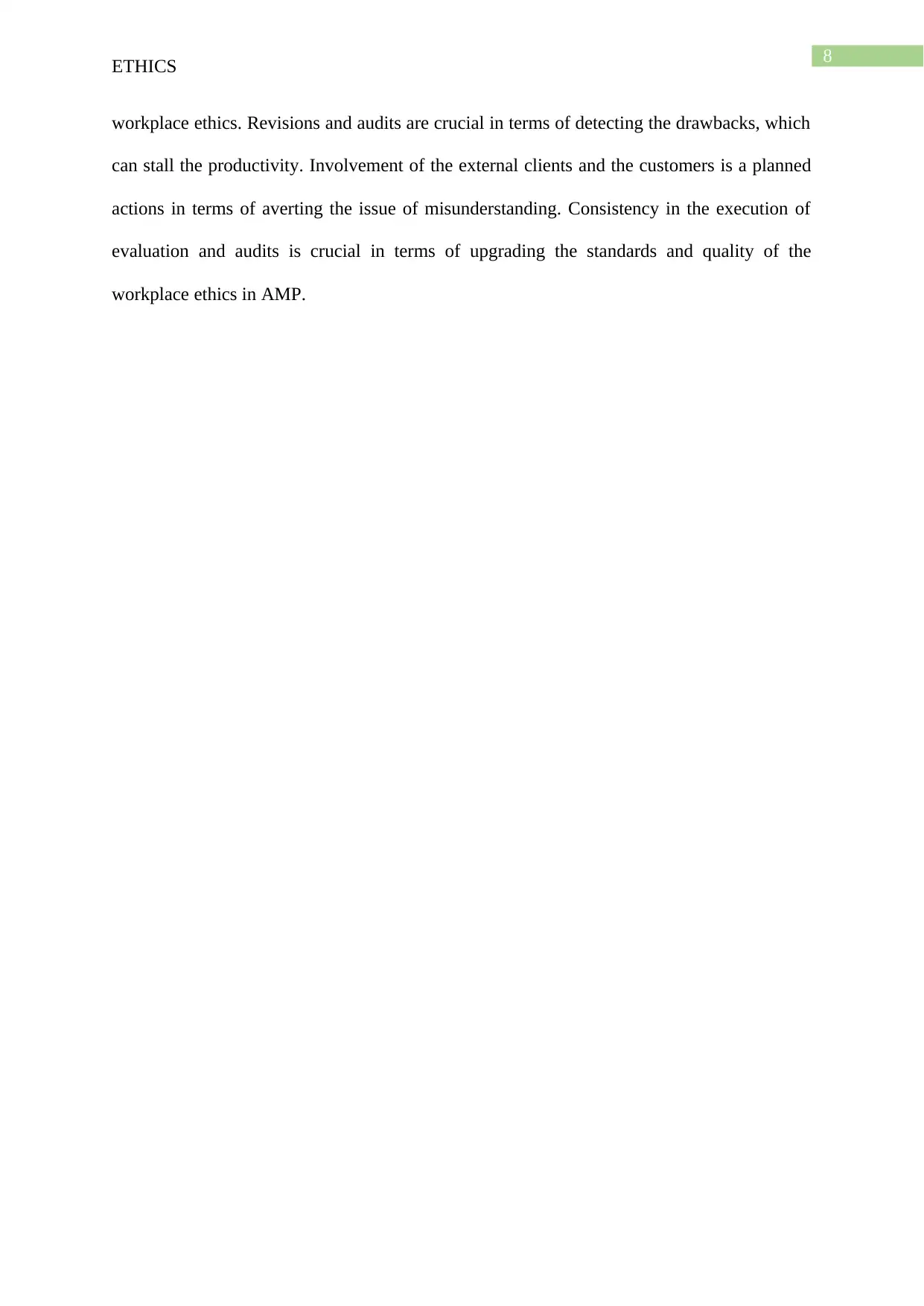
8
ETHICS
workplace ethics. Revisions and audits are crucial in terms of detecting the drawbacks, which
can stall the productivity. Involvement of the external clients and the customers is a planned
actions in terms of averting the issue of misunderstanding. Consistency in the execution of
evaluation and audits is crucial in terms of upgrading the standards and quality of the
workplace ethics in AMP.
ETHICS
workplace ethics. Revisions and audits are crucial in terms of detecting the drawbacks, which
can stall the productivity. Involvement of the external clients and the customers is a planned
actions in terms of averting the issue of misunderstanding. Consistency in the execution of
evaluation and audits is crucial in terms of upgrading the standards and quality of the
workplace ethics in AMP.
⊘ This is a preview!⊘
Do you want full access?
Subscribe today to unlock all pages.

Trusted by 1+ million students worldwide
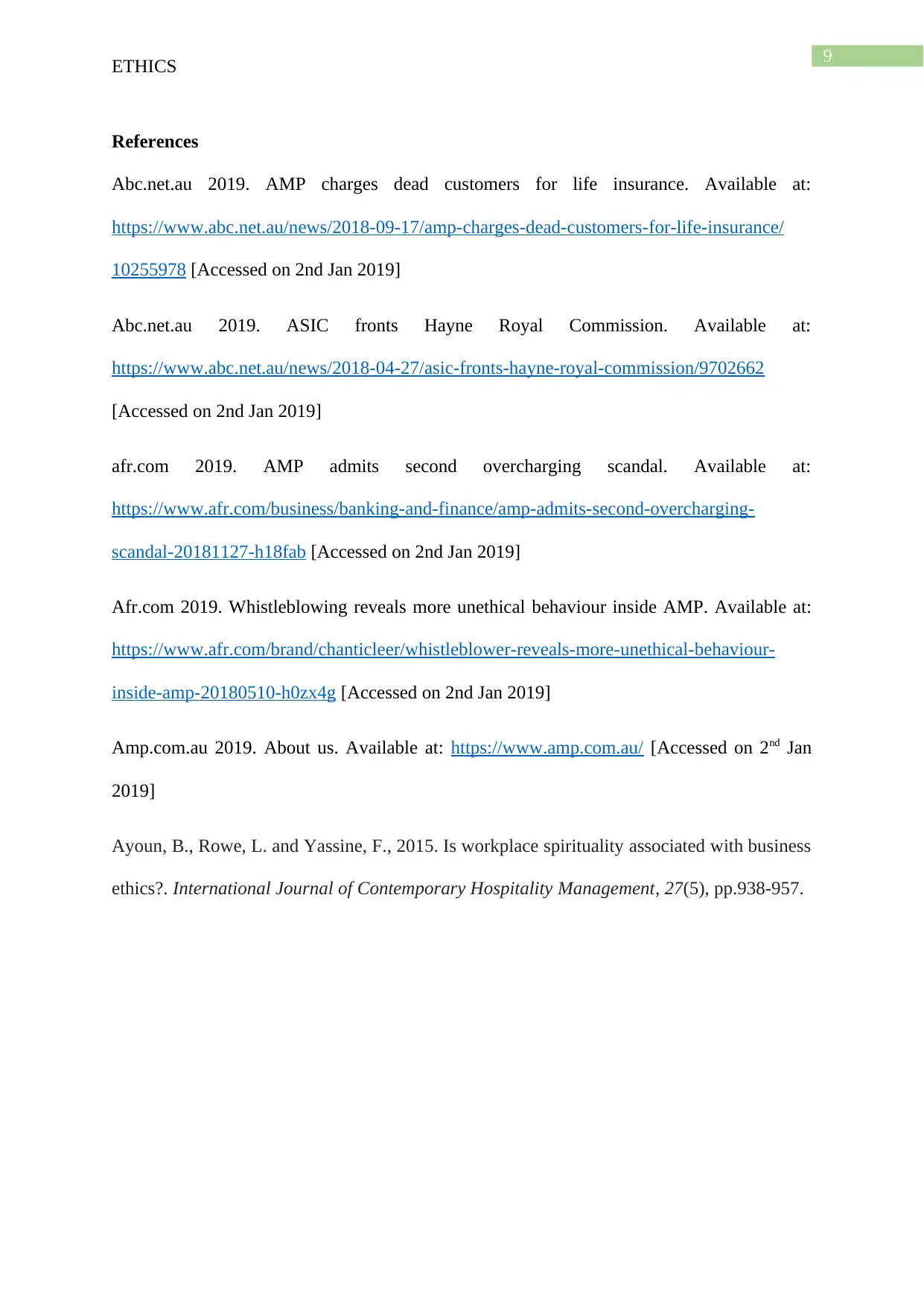
9
ETHICS
References
Abc.net.au 2019. AMP charges dead customers for life insurance. Available at:
https://www.abc.net.au/news/2018-09-17/amp-charges-dead-customers-for-life-insurance/
10255978 [Accessed on 2nd Jan 2019]
Abc.net.au 2019. ASIC fronts Hayne Royal Commission. Available at:
https://www.abc.net.au/news/2018-04-27/asic-fronts-hayne-royal-commission/9702662
[Accessed on 2nd Jan 2019]
afr.com 2019. AMP admits second overcharging scandal. Available at:
https://www.afr.com/business/banking-and-finance/amp-admits-second-overcharging-
scandal-20181127-h18fab [Accessed on 2nd Jan 2019]
Afr.com 2019. Whistleblowing reveals more unethical behaviour inside AMP. Available at:
https://www.afr.com/brand/chanticleer/whistleblower-reveals-more-unethical-behaviour-
inside-amp-20180510-h0zx4g [Accessed on 2nd Jan 2019]
Amp.com.au 2019. About us. Available at: https://www.amp.com.au/ [Accessed on 2nd Jan
2019]
Ayoun, B., Rowe, L. and Yassine, F., 2015. Is workplace spirituality associated with business
ethics?. International Journal of Contemporary Hospitality Management, 27(5), pp.938-957.
ETHICS
References
Abc.net.au 2019. AMP charges dead customers for life insurance. Available at:
https://www.abc.net.au/news/2018-09-17/amp-charges-dead-customers-for-life-insurance/
10255978 [Accessed on 2nd Jan 2019]
Abc.net.au 2019. ASIC fronts Hayne Royal Commission. Available at:
https://www.abc.net.au/news/2018-04-27/asic-fronts-hayne-royal-commission/9702662
[Accessed on 2nd Jan 2019]
afr.com 2019. AMP admits second overcharging scandal. Available at:
https://www.afr.com/business/banking-and-finance/amp-admits-second-overcharging-
scandal-20181127-h18fab [Accessed on 2nd Jan 2019]
Afr.com 2019. Whistleblowing reveals more unethical behaviour inside AMP. Available at:
https://www.afr.com/brand/chanticleer/whistleblower-reveals-more-unethical-behaviour-
inside-amp-20180510-h0zx4g [Accessed on 2nd Jan 2019]
Amp.com.au 2019. About us. Available at: https://www.amp.com.au/ [Accessed on 2nd Jan
2019]
Ayoun, B., Rowe, L. and Yassine, F., 2015. Is workplace spirituality associated with business
ethics?. International Journal of Contemporary Hospitality Management, 27(5), pp.938-957.
Paraphrase This Document
Need a fresh take? Get an instant paraphrase of this document with our AI Paraphraser
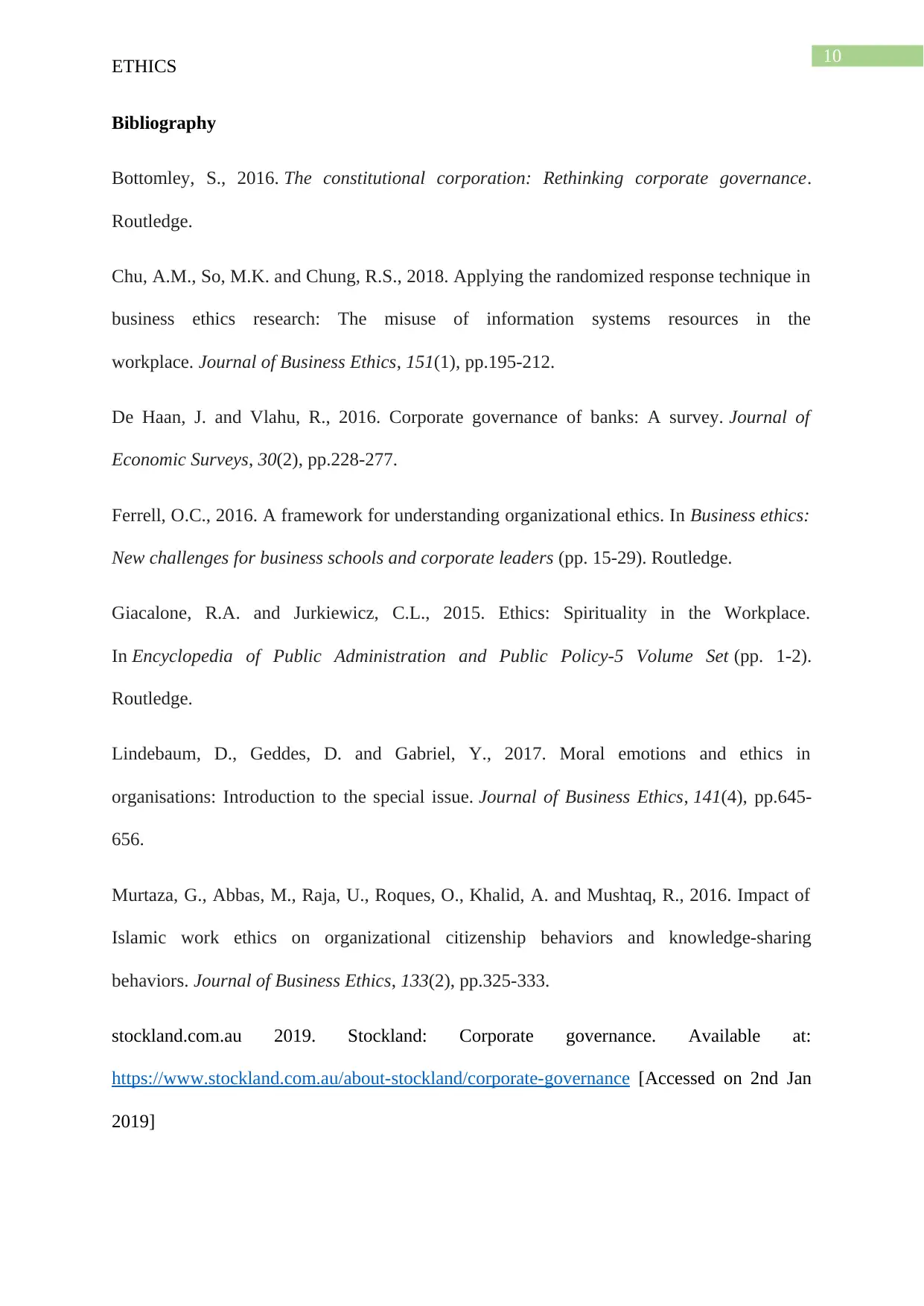
10
ETHICS
Bibliography
Bottomley, S., 2016. The constitutional corporation: Rethinking corporate governance.
Routledge.
Chu, A.M., So, M.K. and Chung, R.S., 2018. Applying the randomized response technique in
business ethics research: The misuse of information systems resources in the
workplace. Journal of Business Ethics, 151(1), pp.195-212.
De Haan, J. and Vlahu, R., 2016. Corporate governance of banks: A survey. Journal of
Economic Surveys, 30(2), pp.228-277.
Ferrell, O.C., 2016. A framework for understanding organizational ethics. In Business ethics:
New challenges for business schools and corporate leaders (pp. 15-29). Routledge.
Giacalone, R.A. and Jurkiewicz, C.L., 2015. Ethics: Spirituality in the Workplace.
In Encyclopedia of Public Administration and Public Policy-5 Volume Set (pp. 1-2).
Routledge.
Lindebaum, D., Geddes, D. and Gabriel, Y., 2017. Moral emotions and ethics in
organisations: Introduction to the special issue. Journal of Business Ethics, 141(4), pp.645-
656.
Murtaza, G., Abbas, M., Raja, U., Roques, O., Khalid, A. and Mushtaq, R., 2016. Impact of
Islamic work ethics on organizational citizenship behaviors and knowledge-sharing
behaviors. Journal of Business Ethics, 133(2), pp.325-333.
stockland.com.au 2019. Stockland: Corporate governance. Available at:
https://www.stockland.com.au/about-stockland/corporate-governance [Accessed on 2nd Jan
2019]
ETHICS
Bibliography
Bottomley, S., 2016. The constitutional corporation: Rethinking corporate governance.
Routledge.
Chu, A.M., So, M.K. and Chung, R.S., 2018. Applying the randomized response technique in
business ethics research: The misuse of information systems resources in the
workplace. Journal of Business Ethics, 151(1), pp.195-212.
De Haan, J. and Vlahu, R., 2016. Corporate governance of banks: A survey. Journal of
Economic Surveys, 30(2), pp.228-277.
Ferrell, O.C., 2016. A framework for understanding organizational ethics. In Business ethics:
New challenges for business schools and corporate leaders (pp. 15-29). Routledge.
Giacalone, R.A. and Jurkiewicz, C.L., 2015. Ethics: Spirituality in the Workplace.
In Encyclopedia of Public Administration and Public Policy-5 Volume Set (pp. 1-2).
Routledge.
Lindebaum, D., Geddes, D. and Gabriel, Y., 2017. Moral emotions and ethics in
organisations: Introduction to the special issue. Journal of Business Ethics, 141(4), pp.645-
656.
Murtaza, G., Abbas, M., Raja, U., Roques, O., Khalid, A. and Mushtaq, R., 2016. Impact of
Islamic work ethics on organizational citizenship behaviors and knowledge-sharing
behaviors. Journal of Business Ethics, 133(2), pp.325-333.
stockland.com.au 2019. Stockland: Corporate governance. Available at:
https://www.stockland.com.au/about-stockland/corporate-governance [Accessed on 2nd Jan
2019]
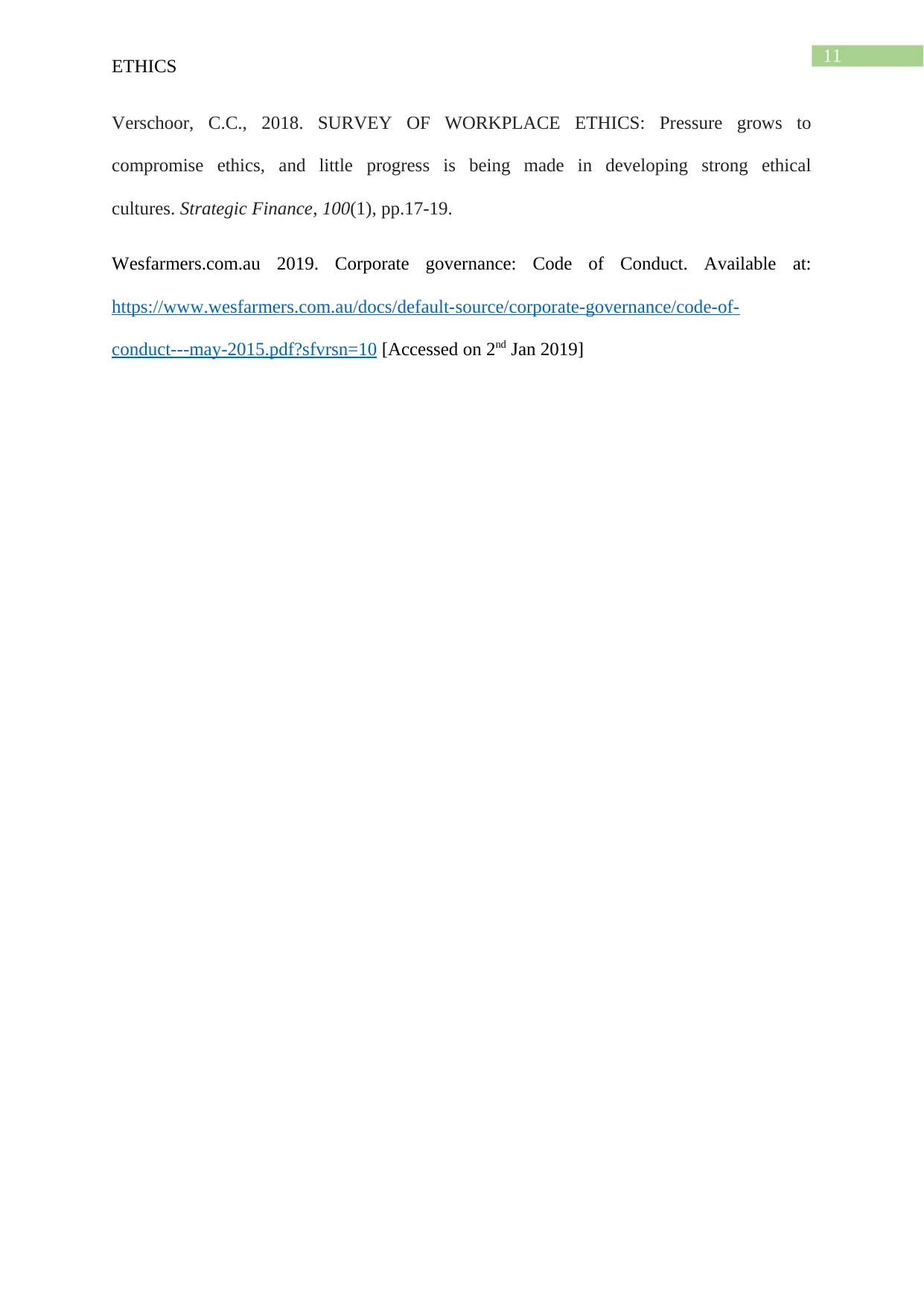
11
ETHICS
Verschoor, C.C., 2018. SURVEY OF WORKPLACE ETHICS: Pressure grows to
compromise ethics, and little progress is being made in developing strong ethical
cultures. Strategic Finance, 100(1), pp.17-19.
Wesfarmers.com.au 2019. Corporate governance: Code of Conduct. Available at:
https://www.wesfarmers.com.au/docs/default-source/corporate-governance/code-of-
conduct---may-2015.pdf?sfvrsn=10 [Accessed on 2nd Jan 2019]
ETHICS
Verschoor, C.C., 2018. SURVEY OF WORKPLACE ETHICS: Pressure grows to
compromise ethics, and little progress is being made in developing strong ethical
cultures. Strategic Finance, 100(1), pp.17-19.
Wesfarmers.com.au 2019. Corporate governance: Code of Conduct. Available at:
https://www.wesfarmers.com.au/docs/default-source/corporate-governance/code-of-
conduct---may-2015.pdf?sfvrsn=10 [Accessed on 2nd Jan 2019]
⊘ This is a preview!⊘
Do you want full access?
Subscribe today to unlock all pages.

Trusted by 1+ million students worldwide
1 out of 12
Related Documents
Your All-in-One AI-Powered Toolkit for Academic Success.
+13062052269
info@desklib.com
Available 24*7 on WhatsApp / Email
![[object Object]](/_next/static/media/star-bottom.7253800d.svg)
Unlock your academic potential
Copyright © 2020–2026 A2Z Services. All Rights Reserved. Developed and managed by ZUCOL.




